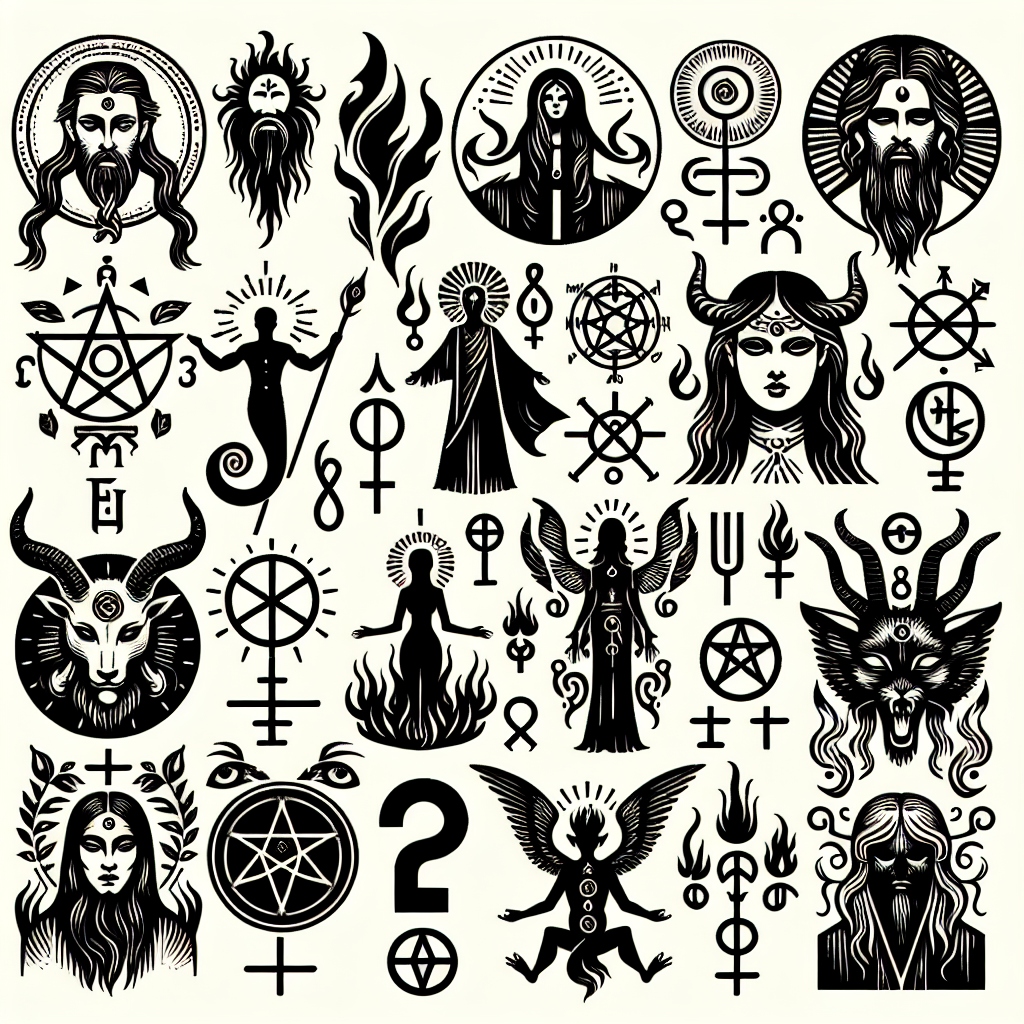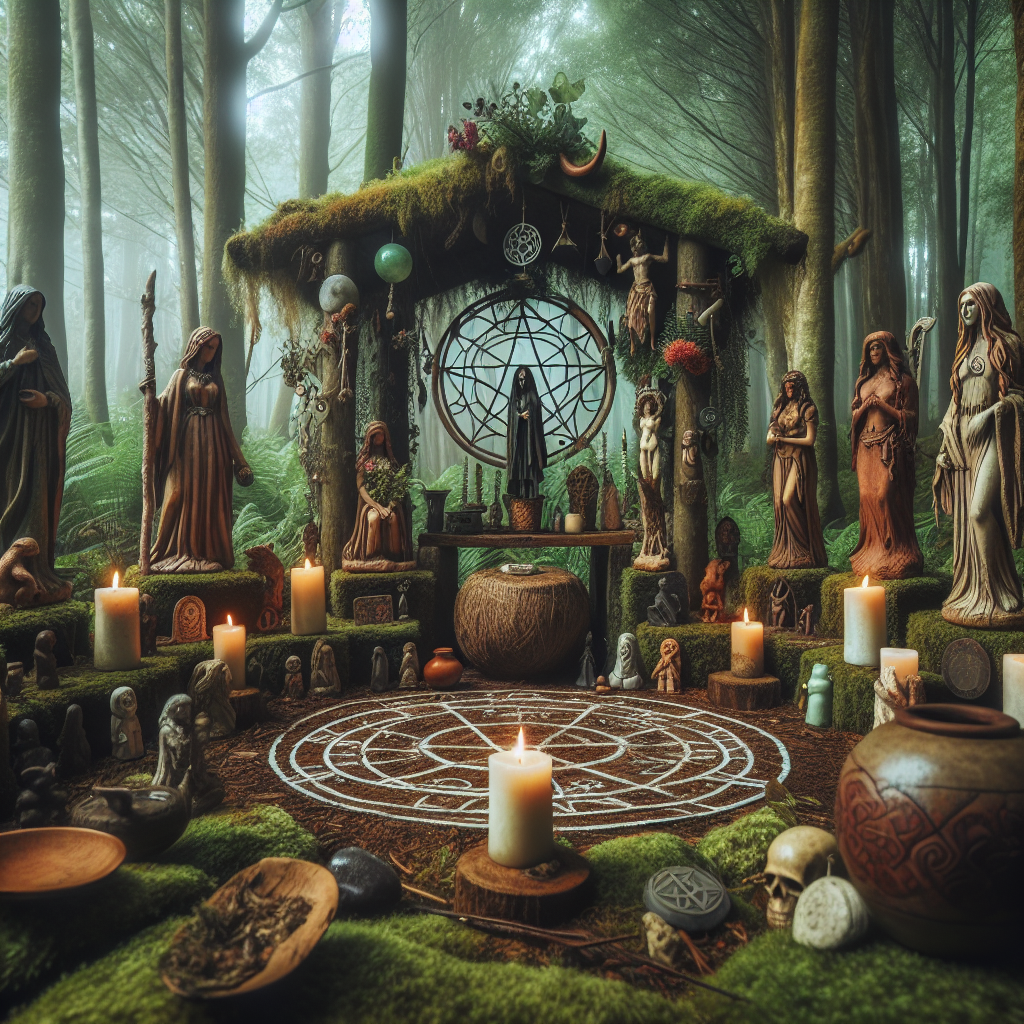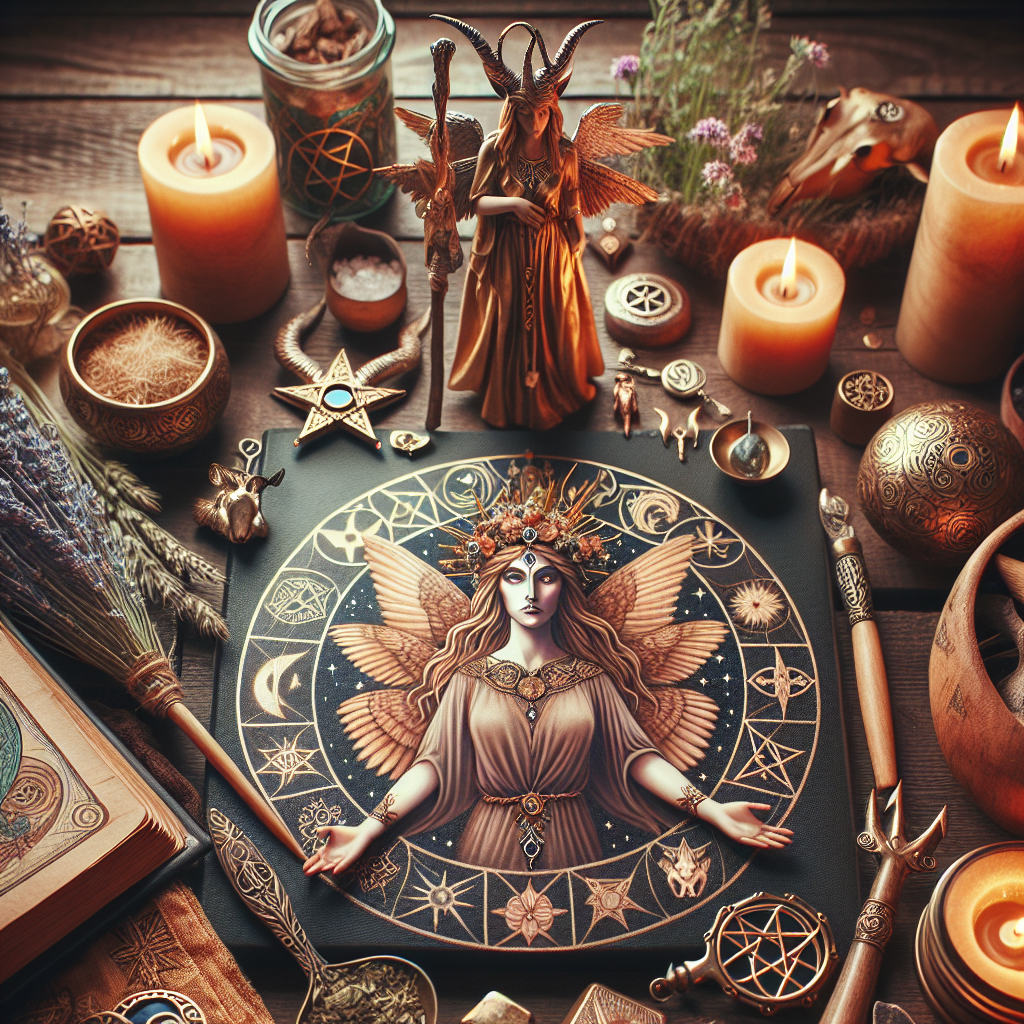As an Amazon Associate I earn from qualifying purchases.

Introduction
Wicca, as a contemporary Pagan religious movement, honors a diverse pantheon of deities, reflecting the religion's deep roots in ancient traditions and its focus on nature. Since its mid-20th-century inception, Wicca has grown significantly, now boasting hundreds of thousands of adherents around the globe. Each deity in Wiccan practice serves specific aspects of life and the universe, offering followers a way to connect with the divine in distinct and meaningful ways. Recognizing and honoring these deities not only enriches spiritual practice but also helps preserve the heritage of this modern yet ancient path.
The 12 Wiccan Deities You Should Know and Honor
The Goddess and the God
The two principal deities in Wicca are the Goddess and the God, embodying the feminine and masculine aspects of the divine. The Goddess is often associated with the Earth, moon, fertility, and nature, commonly depicted as a triple goddess with aspects of the Maiden, Mother, and Crone. The God, frequently represented as the Horned God, symbolizes the sun, forests, and animals, and is often connected to cycles of life, death, and rebirth. Together, they form the polarity that is central to Wiccan theology, representing balance and harmony in the universe.
Brigid
Brigid is a prominent Celtic goddess revered in Wicca for her associations with fire, healing, poetry, and smithcraft. Her feast day, known as Imbolc, falls on February 1st, celebrating the coming of spring. Followers honor Brigid by lighting candles and fires, crafting Brigid crosses, and invoking her aid in creative and healing endeavors. Her worship reflects Wicca's deep seasonal and agricultural ties, emphasizing renewal and creativity.
Cernunnos
Cernunnos, often depicted with antlers, is an ancient Celtic god associated with nature, animals, fertility, and the underworld. In Wiccan practice, he is aligned with the Horned God aspect, representing the powerful, wild spirit of nature and the cycle of life and death. Rituals involving Cernunnos often include offerings of natural elements like leaves, nuts, and antlers, fostering a deep connection with the earth and the wild.
Diana
Diana, a Roman goddess of the hunt, moon, and childbirth, is embraced by Wiccans for her embodiment of independence, strength, and feminine power. As a lunar deity, she is particularly revered during full moons and connected to the Maiden aspect of the Triple Goddess. Her worship might include moonlit rituals, offerings of silver, and invocations emphasizing freedom, protection, and feminine wisdom.
Hecate
Hecate, the ancient Greek goddess of magic, witchcraft, and the crossroads, holds significant power within Wiccan circles. Often depicted as a crone or an old woman, she is associated with the waning moon and the dark phases of life. Followers call upon Hecate for guidance in divination, spells, and during moments of transition and uncertainty. Her sacred symbols include keys, torches, and dogs, reflecting her domains of passage and protection.
Pan
Pan, the Greek god of the wild, shepherds, and flocks, embodies the untamed, joyous spirit of nature in Wiccan practice. Known for his musical prowess with the flute, Pan's energy fosters fertility, celebration, and a deep connection to the earth's natural rhythms. Wiccans might honor Pan through dance, music, and rituals in natural settings, paying homage to the ecstasy and freedom found in nature's embrace.
Isis
Isis, the Egyptian goddess of magic, motherhood, and protection, is a powerful figure in Wiccan tradition. Her myths of resurrection and her role as a healer make her an important deity for rituals centered on rebirth and transformation. Wiccans celebrate Isis through elaborate rituals, offerings of flowers and incense, and practices focused on nurturing and magical empowerment.
Odin
Odin, the Norse god of wisdom, war, and poetry, is revered for his pursuit of knowledge and strength. Known for his sacrifice of an eye to gain wisdom, Odin's influence is sought in Wiccan rituals for learning, power, and profound transformation. His symbols include the raven, the spear, and the runes, which practitioners use in divination to seek his guidance and insight.
Thoth
Thoth, the Egyptian deity of writing, knowledge, and the moon, represents intellectual pursuit and magical practices in Wiccan worship. Often depicted with the head of an ibis, Thoth embodies the power of language, wisdom, and the lunar mysteries. Wiccans might invoke Thoth during spells for knowledge, clarity, or moon-based rituals, celebrating his role in recording and preserving the divine word.
Freya
Freya, a Norse goddess of love, beauty, and war, captures the essence of complex femininity and power. Associated with fertility, magic, and the afterlife, Freya is honored in Wicca for her passionate, warrior spirit and deep connection to the earth. Rituals involving Freya may include offerings of mead, flowers, and invocations for love, beauty, and strength.
Demeter
Demeter, the Greek goddess of the harvest and agriculture, embodies the sacred cycle of growth, death, and rebirth in nature. Wiccans celebrate Demeter during the harvest festivals, recognizing her role in sustaining life and her grief for her daughter Persephone, who resides in the underworld for part of the year. Offerings of grain, bread, and fruit, along with rituals of thanksgiving and seasonal observance, honor Demeter's sustaining power.
**Answer to: 12 Wiccan Deities You Should Know and Honor**
1. **The Horned God (Cernunnos)**
In Wicca, the Horned God, often associated with Cernunnos from Celtic mythology, represents the male aspect of divinity. He embodies nature, wilderness, fertility, and the cycle of life and death. Understanding and veneration of the Horned God are central to many Wiccan spiritual practices, as he symbolizes the eternally renewing natural world.
2. **The Triple Goddess**
The Triple Goddess, represented as Maiden, Mother, and Crone, epitomizes the female aspect of the divine in Wicca. This triadic structure honors the phases of the moon and the cycle of a woman's life, embodying purity, fertility, wisdom, and the interconnectedness of all life stages.
3. **Brigid**
Brigid, an Irish goddess, embodies many aspects such as poetry, healing, and smithcraft. She is a central figure within the Wiccan pantheon, especially revered during the festival of Imbolc, which celebrates new beginnings and the coming of spring.
4. **Hecate**
Hecate, often associated with Greek mythology, is a complex deity representing magic, witchcraft, the night, and the crossroads. As a guardian of boundaries and a powerful sorceress, she is a guiding figure for those practicing Wicca, aiding in rituals and protection spells.
5. **Lugh**
Lugh, a prominent god in Irish mythology, symbolizes skill and mastery in many domains such as the arts, combat, and craftsmanship. He is celebrated in the festival of Lughnasadh, which marks the first harvest and is a time of community gathering and offering thanks.
6. **Diana**
Diana, originating from Roman mythology, is the goddess of the hunt, moon, and nature. In Wiccan practice, she represents independence, strength, and the wild aspects of nature. Honoring Diana involves acknowledging the spiritual honor of autonomy and connection to the natural world.
7. **Thoth**
Thoth, from Egyptian mythology, is the deity of wisdom, writing, and knowledge. His attributes make him a popular figure within the Wiccan pantheon for those seeking intellectual growth and spiritual insight through learned practices like divination and scrying.
8. **Ostara**
Ostara, a Germanic goddess of spring, dawn, and renewal, is celebrated during the Wiccan festival of Ostara (spring equinox). Her association with rebirth and growth aligns with the Wiccan emphasis on the cycles of nature and the importance of balance and new beginnings.
9. **Pan**
Pan, the Greek god of the wild, shepherds, and rustic music, embodies untamed nature and uninhibited joy. His presence in Wicca highlights the divine in Wicca aspects of merriment, connection to the earth, and the life force that flows through all beings.
10. **Isis**
Isis, an Egyptian goddess and a significant figure within many Wiccan traditions, represents motherhood, magic, and healing. Her nurturing and protective nature make her a powerful goddess to honor for those who seek comfort, empowerment, and transformation.
11. **Kali**
Kali, a Hindu goddess, represents destruction and renewal, embodying the dual forces of creation and annihilation. Within the Wiccan context, she is venerated for her ability to destroy ignorance and ego, paving the way for new growth and spiritual enlightenment.
12. **Anubis**
Anubis, the Egyptian god of the afterlife and mummification, assists souls on their journey through the afterlife. His role in guiding and protecting spirits aligns with Wiccan practices that honor ancestors and seek to understand the mysteries of life and death.
With roughly 1.5 million practitioners in the United States alone, Wicca continues to grow, highlighting the enduring appeal and relevance of these deities in contemporary spiritual practices.
u003ch2u003eCernunnosu003c/h2u003e
u003cpu003eOne of my most profound experiences was during a moonlit ritual dedicated to Cernunnos, the Horned God. I felt a deep connection to nature as I stood beneath the expanse of the night sky, surrounded by the sound of rustling leaves and the occasional hoot of an owl. The ritualistic chants and offerings created a bridge between me and the primal energy that Cernunnos embodies. I could almost feel his presence, an ancient guardian of the forest, watching over me as I communed with the earth.u003c/pu003e
u003cpu003eAnother memorable event happened during a hike where I found myself in an untouched grove. The atmosphere was electric, almost as if the spirit of Cernunnos was near. Placing an offering of fruits and nuts, I silently thanked him for the abundance and protection he provides. In that sacred moment, I felt a surge of energy running through me, affirming the tangible presence of this deity.u003c/pu003e
u003cpu003eI often create small altars in the woods to honor Cernunnos, adorning them with elements from nature such as pinecones, feathers, and stones. Each time I engage in these practices, the link between the earthly and the divine seems to strengthen, enriching my spiritual journey.u003c/pu003e
u003ch2u003eBrigidu003c/h2u003e
u003cpu003eMy initiation into Brigid's mysteries happened near Imbolc, when I attended a communal festival. The experience of invoking her name in unison with fellow Wiccans was magical. We lit candles and gathered around a well, invoking Brigid's blessings for creativity and healing. The warmth from the flames seemed to reflect her protective and nurturing essence.u003c/pu003e
u003cpu003eOne particular experience with Brigid involved crafting a Brigid's Cross with my own hands. As I wove the rushes together, I felt a meditative calm and a sense of unity with the seasons and cycles. It was as if Brigid's wisdom flowed through my fingers, imparting a deeper understanding of transformation and renewal.u003c/pu003e
u003cpu003eVisiting a sacred well dedicated to Brigid in Ireland was a pilgrimage that etched her presence into my soul. The serenity and sanctity of the space were palpable. As I drew water from the well, I felt her ancient power of healing and inspiration pour into my being, affirming my devotion to her.u003c/pu003e
u003ch2u003eHecateu003c/h2u003e
u003cpu003eMy relationship with Hecate, the goddess of crossroads, began during a solitary ritual on a new moon. I felt an innate pull towards her realm of mystery and magic. As I stood at a literal crossroads, offering keys and incense, the air around me thickened, and I sensed her guiding presence. It was a beckoning towards transformation and deeper understanding of the occult.u003c/pu003e
u003cpu003eAnother touching moment occurred when I initiated a spell for protection. Invoking Hecate’s name, I instantly felt a cloak of security envelop me. Her power to guard the hidden paths and offer insight has always facilitated transformative journeys in my spiritual practice, offering both protection and wisdom.u003c/pu003e
u003cpu003eDuring a shadow work session, Hecate’s torch revealed aspects of myself that needed healing. The emotional intensity was balanced by a profound sense of empowerment that I embraced, thanks to her guidance. This encounter reaffirmed the significance of her role in navigating life’s darker aspects.u003c/pu003e
u003ch2u003ePanu003c/h2u003e
u003cpu003eMy bond with Pan began during an ecstatic dance at a Beltane festival. The primal rhythm of drums and the lively energy of the participants created a vortex of celebratory spirit. As I danced barefoot on the earth, I felt a jubilant connection to Pan, the god of the wild. His energy was infectious, filling me with an unrestrained joy and a sense of freedom.u003c/pu003e
u003cpu003eOn another occasion, I meditated in a secluded meadow, aiming to connect with Pan’s essence. The gentle breeze and the distant sound of a flowing stream added to the magical ambiance. As I played a simple melody on my flute, I felt Pan’s presence as a whispering in the wind, a reminder of the playful and unbound aspects of nature.u003c/pu003e
u003cpu003eTending to a small garden dedicated to Pan is a regular practice that reinforces our connection. The act of planting and nurturing herbs and flowers feels like a partnership with him, celebrating the cycles of growth and decay. Through these small yet significant acts, Pan’s energy permeates my daily life, adding an element of joyous revelry to my spiritual practice.u003c/pu003e
u003cH2>FAQ 1: Who are the main deities in Wicca?u003c/H2>
u003cp>Wicca is a nature-based religion that honors both a God and a Goddess, often referred to as the Horned God and the Triple Goddess. Additionally, many Wiccans incorporate a variety of other deities from different pantheons such as Celtic, Greek, Roman, and Egyptian.u003c/p>
u003cH2>FAQ 2: Do Wiccans worship the same gods universally?u003c/H2>
u003cp>No, Wiccan practices are highly individualized. Different Wiccans may venerate a variety of deities depending on personal affinity, cultural background, and spiritual tradition.u003c/p>
u003cH2>FAQ 3: What is meant by the Wiccan pantheon?u003c/H2>
u003cp>The Wiccan pantheon refers to the collection of deities that individual Wiccans might honor and work with in their religious and magical practices. This pantheon can vary widely among different practitioners.u003c/p>
u003cH2>FAQ 4: Is it mandatory to honor all the deities in Wicca?u003c/H2>
u003cp>No, it is not mandatory to honor all the deities. Wicca is a flexible and personal religion, so practitioners are free to choose which deities they feel a connection with and wish to honor in their practices.u003c/p>
u003cH2>FAQ 5: How do I choose which Wiccan deities to honor?u003c/H2>
u003cp>Choosing which deities to honor is a personal decision. You might start by researching and reading about different deities, meditating, or asking for signs and guidance from the divine. Trust your intuition to guide you to the deities that resonate with you.u003c/p>
u003cH2>FAQ 6: Can I honor deities from different cultures in my Wiccan practice?u003c/H2>
u003cp>Yes, many Wiccans honor deities from a variety of cultural traditions. While it’s important to approach this practice with respect and understanding of each tradition, blending deities from different cultures is common in Wicca.u003c/p>
u003cH2>FAQ 7: How do I properly honor a Wiccan deity?u003c/H2>
u003cp>Honoring a Wiccan deity can be done through various practices such as setting up an altar, offering prayers, making offerings, conducting rituals, and keeping the deity in your thoughts during meditation. Researching traditional ways of honoring specific deities can also provide guidance.u003c/p>
u003cH2>FAQ 8: Is there a specific prayer or ritual for each Wiccan deity?u003c/H2>
u003cp>There isn’t a universal prayer or ritual for each deity that all Wiccans follow since practices can be highly personalized. However, you can find or create prayers and rituals that feel meaningful to you and are in line with the characteristics and myths of the deity you wish to honor.u003c/p>
u003cH2>FAQ 9: Can non-Wiccans honor Wiccan deities?u003c/H2>
u003cp>Yes, non-Wiccans can choose to honor Wiccan deities if they feel a spiritual connection. It is important to approach this practice with respect, understanding, and a willingness to learn about the traditions associated with these deities.u003c/p>
u003cH2>FAQ 10: How can I learn more about Wiccan deities?u003c/H2>
u003cp>To learn more about Wiccan deities, consider reading books on Wicca, attending workshops, joining Wiccan communities or forums, and seeking guidance from experienced practitioners. Personal research and direct spiritual experiences can also provide valuable insights.u003c/p>

## Conclusion
Throughout this exploration of 12 Wiccan deities, key insights into the rich tapestry of the Wiccan pantheon reveal the depth and diversity inherent in Wiccan spirituality. Each deity, from the Triple Goddess embodying the phases of life and the Moon's cycles to the Horned God representing nature, fertility, and the wild aspects of existence, underscores the interconnectedness central to Wiccan beliefs. These deities are not remote entities but vibrant aspects of existence that practitioners honor to attune themselves with the natural and spiritual worlds. Deities like Brigid, Cerridwen, and Lugh illustrate the multifaceted nature of divinity in Wicca, encapsulating elements of healing, transformation, wisdom, and creativity.
Honoring these deities involves a personal, introspective journey, where rituals, offerings, and celebrations become avenues through which individuals can connect deeply with these divine forces. Acknowledging entities such as Hecate, the keeper of the crossroads, and Pan, the embodiment of the natural world's vitality, enables practitioners to forge a profound relationship with both ancient wisdom and contemporary spiritual practices. These deities, while rooted in historical traditions, provide a dynamic and adaptable framework for modern Wiccans to engage with the divine. By understanding and honoring these 12 Wiccan deities, practitioners enrich their spiritual practice, fostering a harmonious balance between the seen and unseen realms, and nurturing their innate connection to the cosmos.
Amazon and the Amazon logo are trademarks of Amazon.com, Inc, or its affiliates.


